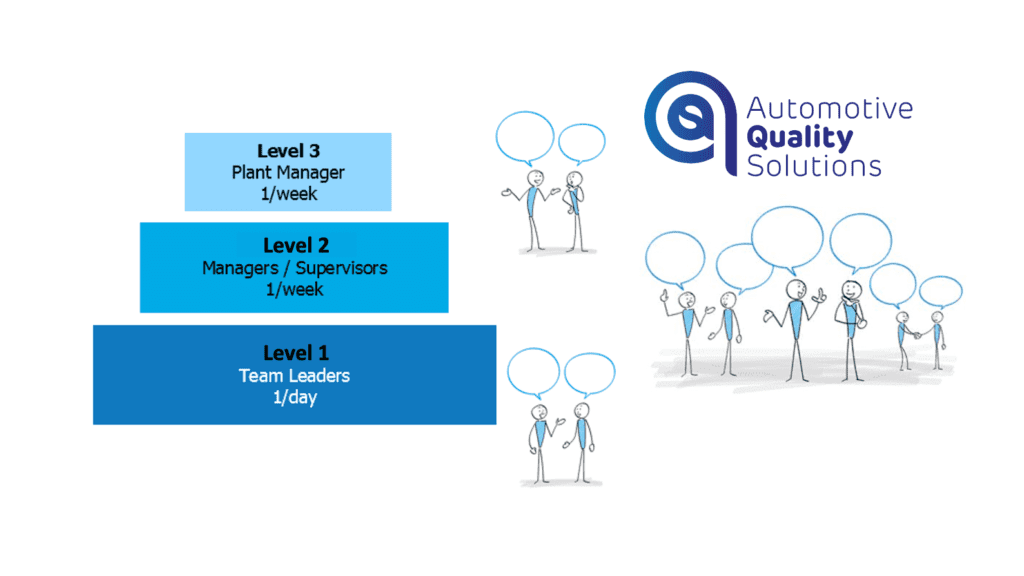LPA audit is an important element of the organization’s maturity in functioning. Additionally, it offers numerous benefits to management, providing an opportunity for a better understanding of the company’s production processes.
Listed below are the main arguments confirming the legitimacy of implementing LPA audit and conducting it at Levels 2 and 3, i.e., by management. Unlike Level 1, which is performed once per shift, Levels 2 and 3 audits are conducted less frequently, usually once a week.
Lessons Learned from previous LPA Audit
By reviewing lessons learned from previous LPA audits, management can effectively intervene to identify the root cause of delays in activity implementation. This enables directors or managers to escalate issues promptly during daily or management meetings.
Identifying recurring problems
Recurring issues may indicate systemic problems, leading to increased operating costs within the production facility and potential escalation from clients externally.
Establishing expected knowledge levels
This aspect focuses on ensuring that leaders possess the required competencies to effectively manage specific production processes.
Ensuring production control
This activity enables managers or plant directors to verify production control by directly interacting with leaders on the production line.
Examples:
- How are identified non-conformities managed?
- Are there any topics requiring escalation?
Gathering feedback on specific areas
This process allows for immediate identification of knowledge gaps during LPA audits. For instance, if different production areas exist within the plant (e.g., fuel and high-pressure lines), it ensures that processes functioning well in one area are also optimized in the other.
Ultimately, this data can be utilized to enhance organizational efficiency by comparing LPAs across different areas.
Recognition of leaders for properly performed work
If everything appears to be in order during the audit of a particular line, it’s important to acknowledge this with the leader. This recognition communicates appreciation for their efforts.
Comparing production lines/shifts based on LPA audit results
Engaging in this activity allows us to gather valuable insights and experience as LPA auditors. By identifying best practices in certain areas, we can then implement them across other production lines.
Eliminating failures
Properly conducted LPAs, identifying non-conformities, and managing them appropriately impact all aspects of the company, from health and safety to environmental, quality, OEE, and energy consumption reduction issues.
Fresh perspective
Conducting weekly audits across different areas ensures that we won’t revisit the same workstation for several weeks. This rotation provides us with a fresh perspective on the subjects we’re verifying. Additionally, conducting audits in various areas allows us to gain more knowledge.
Verification of activities, standards, and changes effectiveness during LPA audit
The best practice is to verify implementation by checking if planned actions have been executed. During LPAs, we may request documentation updates or view workstation layouts to cross-check actions.
Understanding LPA audit throughout the plant
It’s essential to ensure that everyone understands the purpose and benefits of LPAs and how they contribute to increased awareness among operators and leaders, ultimately bringing measurable value to the company.
Calibration
Calibration offers an opportunity to better understand leaders and operators, exchange views, gain knowledge, and improve production line management. It also enhances the competence of LPA auditors.
Partnership approach
This approach eliminates distance and emphasizes mutual respect, improving communication during LPA audits.
Understanding from the production point of view
Production has its own set of experiences, realities, and working criteria, which may differ from our perspective. LPAs can help diagnose scenarios where production faces challenges that may not be immediately apparent.
“You are Our eyes and ears” approach
Production employees, including leaders and operators, possess valuable insights due to their constant presence on the production line. LPAs provide a mechanism for identifying issues that may otherwise go unnoticed.
Offering assistance
Supporting leaders in their daily tasks and providing assistance when needed fosters collaboration and prevents leaders from feeling isolated in addressing recurring issues.
Summary of LPA audit benefits
As evidenced by the discussions above, conducting LPA audits on the production line yields numerous benefits for the plant and its management. It’s crucial for management to recognize these advantages, as they contribute to overall operational excellence and success.
By implementing LPAs effectively, we can enhance productivity, ensure product quality, improve safety standards, and foster a culture of continuous improvement. Ultimately, embracing LPA audits benefits everyone involved and leads to collective success.
You can download an automatic, editable Excel form for free on the Free Quality Tools
Document name: Layered Process Audit – Excel form
Dariusz Kowalczyk



